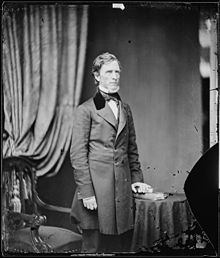William Pitt Fessenden
| William P. Fessenden | |
|---|---|
 |
|
| 26th United States Secretary of the Treasury | |
|
In office July 5, 1864 – March 3, 1865 |
|
| President | Abraham Lincoln |
| Preceded by | Salmon P. Chase |
| Succeeded by | Hugh McCulloch |
|
United States Senator from Maine |
|
|
In office February 10, 1854 – July 1, 1864 |
|
| Preceded by | James W. Bradbury |
| Succeeded by | Nathan A. Farwell |
|
In office March 4, 1865 – September 8, 1869 |
|
| Preceded by | Nathan A. Farwell |
| Succeeded by | Lot M. Morrill |
| Member of the U.S. House of Representatives from Maine's 2nd district |
|
|
In office March 4, 1841 – March 3, 1843 |
|
| Preceded by | Albert Smith |
| Succeeded by | Robert P. Dunlap |
| Member of the Maine House of Representatives | |
|
In office 1832 1838 1845–1846 |
|
| Personal details | |
| Born |
William Pitt Fessenden October 16, 1806 Boscawen, New Hampshire, US |
| Died | September 8, 1869 (aged 62) Portland, Maine, US |
| Resting place | Evergreen Cemetery in Portland, Maine, US |
| Political party | Whig, Opposition, Republican |
| Spouse(s) | Ellen Maria Deering Fessenden |
| Children |
Samuel Fessenden James D. Fessenden Francis Fessenden William Howard Fessenden |
| Alma mater | Bowdoin College (1823) |
| Profession | Politician, Lawyer |
| Religion | Anglicanism later from Episcoplianism |
| Signature | |
William Pitt Fessenden (October 16, 1806 – September 8, 1869) was an American politician from the U.S. state of Maine. Fessenden was a Whig (later a Republican) and member of the Fessenden political family. He served in the United States House of Representatives and Senate before becoming Secretary of the Treasury under President Abraham Lincoln during the American Civil War.
A lawyer, he was a leading antislavery Whig in Maine; in Congress, he fought the Slave Power (the plantation owners who controlled southern states). He built an antislavery coalition in the state legislature that elected him to the U.S. Senate; it became Maine's Republican organization. In the Senate, Fessenden played a central role in the debates on Kansas, denouncing the expansion of slavery. He led Radical Republicans in attacking Democrats Stephen Douglas, Franklin Pierce, and James Buchanan. Fessenden's speeches were read widely, influencing Republicans such as Abraham Lincoln and building support for Lincoln's 1860 Republican presidential nomination. During the war, Senator Fessenden helped shape the Union's taxation and financial policies. He moderated his earlier radicalism, and supported Lincoln against the Radicals, becoming Lincoln's Treasury Secretary. After the war, Fessenden was back in the Senate, as chair of the Joint Committee on Reconstruction, which established terms for resuming congressional representation for the southern states, and which drafted the Fourteenth Amendment to the United States Constitution. Later, Fessenden provided critical support that prevented Senate conviction of President Andrew Johnson, who had been impeached by the House. He was the first Republican Senator to ring out "...not guilty" followed by six other Republican Senators resulting in the acquittal of President Johnson.
...
Wikipedia
